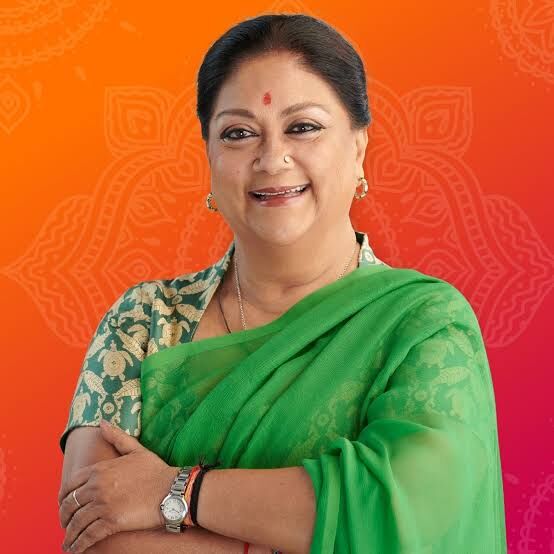Vasundhara Raje's Political Crossroads: Retirement, Comeback, or Limited Role? What's Ahead?
- In English 12 Dec 2023 4:30 PM GMT
- Anurag Tiwari
The 2023 Rajasthan Assembly election marked a turning point in Vasundhara Raje's political journey, with the BJP opting for a fresh face, Bhajan Lal Sharma, over the seasoned leader for the chief ministerial position. Raje's denial for a third term gave speculations to the party's strategy and Raje's political future in the state politics.
In a surprising move, the BJP selected Bhajan Lal Sharma, a first-time MLA from Sanganer, as the Chief Minister of Rajasthan, signaling the end of Vasundhara Raje's era. This decision, coupled with the denial of tickets to Raje's close associates, hinted at a significant shift in the party's dynamics in the state.
The strategic placement of Sharma in Sanganer, the constituency previously held by Raje's ally Ashok Lahoti, added intrigue to the unfolding political narrative. The party's choice not only sidelined Raje's loyal supporters but also raised questions about the direction in which BJP's leadership in Rajasthan is headed.
The appointment of Diya Kumari as Deputy Chief Minister added another layer to the evolving political drama. Despite her previous role as a BJP MP from Rajsamand, Kumari contested from Vidhyadhar Nagar in Jaipur and won with a substantial margin. However, the replacement of incumbent MLA Narpat Singh Rajvi with Kumari in Vidhyadhar Nagar triggered discontent within the party ranks.
The political tension between Vasundhara Raje and Diya Kumari, dating back to 2016 during an anti-encroachment campaign, resurfaced. The sealing of Rajmahal Palace Hotel, owned by Kumari's family, fueled controversy and highlighted the longstanding rift between the two leaders.
Post the December 3 assembly election results, Vasundhara Raje intensified her political engagements, attempting to rally support from BJP and independent MLAs. However, reports suggest that her efforts have not been well-received by the party high command, raising speculation about her standing within the BJP.
Adding to Raje's challenges is the recent accusation against her son, MP Dushyant Singh, who allegedly restricted the movement of five MLAs, including Lalit Meena, in a Jaipur hotel. The accusation, made by Meena's father, former MLA Hemraj Meena, created a storm within the BJP, further complicating Raje's political future.
Raje's strained relationship with the BJP's national leadership, characterized by concerns about perceived arrogance and independent operations, has cast shadows over her political trajectory. As Rajasthan anticipates the formation of its new government, Vasundhara Raje stands at a critical juncture, grappling with the denial of a chief ministerial role, internal party dissent, and the emergence of new leaders.
The long-term impact of these developments on Raje's political career remains uncertain. At 70 years old, having served as chief minister for two terms, she faces pivotal decisions about her future. The possibilities include retirement from politics, a continued but limited role in national politics, or a challenging attempt to make a comeback in Rajasthan. The latter option would demand rebuilding support within the BJP and overcoming the perception that she may no longer be the ideal leader for the state.
The 2023 Rajasthan Assembly election marked a turning point in Vasundhara Raje's political journey, with the BJP opting for a fresh face, Bhajan Lal Sharma, over the seasoned leader for the chief ministerial position. Raje's denial for a third term gave speculations to the party's strategy and Raje's political future in the state politics.
In a surprising move, the BJP selected Bhajan Lal Sharma, a first-time MLA from Sanganer, as the Chief Minister of Rajasthan, signaling the end of Vasundhara Raje's era. This decision, coupled with the denial of tickets to Raje's close associates, hinted at a significant shift in the party's dynamics in the state.
The strategic placement of Sharma in Sanganer, the constituency previously held by Raje's ally Ashok Lahoti, added intrigue to the unfolding political narrative. The party's choice not only sidelined Raje's loyal supporters but also raised questions about the direction in which BJP's leadership in Rajasthan is headed.
The appointment of Diya Kumari as Deputy Chief Minister added another layer to the evolving political drama. Despite her previous role as a BJP MP from Rajsamand, Kumari contested from Vidhyadhar Nagar in Jaipur and won with a substantial margin. However, the replacement of incumbent MLA Narpat Singh Rajvi with Kumari in Vidhyadhar Nagar triggered discontent within the party ranks.
The political tension between Vasundhara Raje and Diya Kumari, dating back to 2016 during an anti-encroachment campaign, resurfaced. The sealing of Rajmahal Palace Hotel, owned by Kumari's family, fueled controversy and highlighted the longstanding rift between the two leaders.
Post the December 3 assembly election results, Vasundhara Raje intensified her political engagements, attempting to rally support from BJP and independent MLAs. However, reports suggest that her efforts have not been well-received by the party high command, raising speculation about her standing within the BJP.
Adding to Raje's challenges is the recent accusation against her son, MP Dushyant Singh, who allegedly restricted the movement of five MLAs, including Lalit Meena, in a Jaipur hotel. The accusation, made by Meena's father, former MLA Hemraj Meena, created a storm within the BJP, further complicating Raje's political future.
Raje's strained relationship with the BJP's national leadership, characterized by concerns about perceived arrogance and independent operations, has cast shadows over her political trajectory. As Rajasthan anticipates the formation of its new government, Vasundhara Raje stands at a critical juncture, grappling with the denial of a chief ministerial role, internal party dissent, and the emergence of new leaders.
The long-term impact of these developments on Raje's political career remains uncertain. At 70 years old, having served as chief minister for two terms, she faces pivotal decisions about her future. The possibilities include retirement from politics, a continued but limited role in national politics, or a challenging attempt to make a comeback in Rajasthan. The latter option would demand rebuilding support within the BJP and overcoming the perception that she may no longer be the ideal leader for the state.





